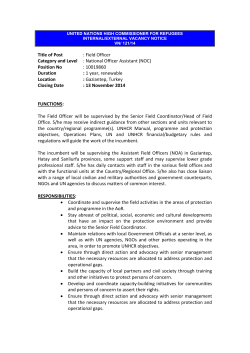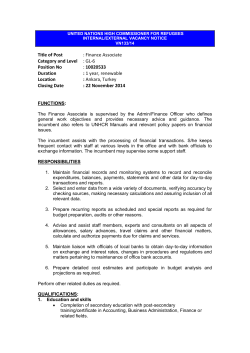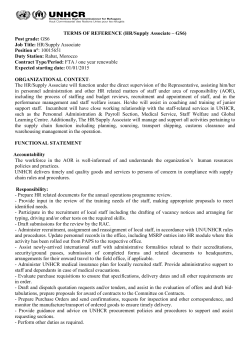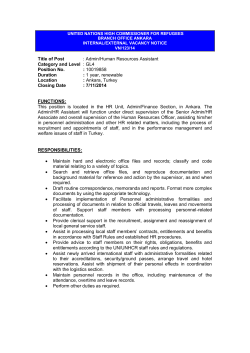
Opération Sahel - Regional Overview
UNHCR Operation in Niger SEPTEMBER 2013 FACT SHEET Operational Highlights The crisis in northern Mali since 2012 has forced some 50,000 Malians into exile into Niger. It has also led to the return of 5,124 nationals of Niger previously living in the Gao area. Most refugees live in the three camps established in Tillaberi region in 2012, namely Abala, Mangaize and Tabareybarey. In 2013, in an attempt to adapt to the specific needs of nomadic refugees, two “refugee hosting areas” were established in Intikane and Tazalit, Tahoua region. These are vast areas where nomadic Malian refugees can settle freely with their livestock enabling them to live according to their traditional and pastoral way of life with grazing land for their animals. In 2013, after the French and Ecowas military intervention and the creation of the MINUSMA force, refugees have continued to cross into Niger though in small numbers. Following the presidential elections in July-August 2013, a back-and-forth movement between Niger and the areas of origin in Mali has been observed but no exact figures are available yet. Hence, UNHCR prepares for a facilitated repatriation programme to start in November 2013 that will provide exact figures. Since the declaration of a state of emergency in May 2013 in Adamawa, Yobe and Borno states in northern Nigeria, thousands of displaced persons (Niger citizens, Nigerian refugees, and third country nationals) have sought refuge in Diffa region, southeast Niger. The local population has generously received the outflow of persons fleeing violence in Nigeria by hosting them in their families and communities. UNHCR, in coordination with partners, provides protection and humanitarian assistance through a community-based approach. Persons of concern by Country of Origin MALI Refugees September 2013 (Level 2 and continuous registration) 49,601 NIGERIA June 2013 August 2013 2,682 5,124 3,544 Returned nationals 94 Third country Total 54,725 6,240* assisted * Based on June registration (Gvt/UN/NGOs) ** Based on July registration (WFP/Red Cross) ***Based on August registration (Gvt) Malian refugees by site July 2013 13,487** 20,000*** Working with the Government Commission Nationale d’Eligibilité (CNE) : protection and security escorts Working with partners UNHCR coordinates humanitarian assistance to refugees and works with various implementing partners: Cadev and Save the Children: urban refugee programme Agence d’Aide à la Coopération Technique et au Développement (ACTED) in Abala Camp and in Diffa Islamic Relief in Mangaize Camp Plan Niger in Tabareybarey Camp Akarass in Tahoua area International Organization of Migration : refugees’ transportation Afrique Secours Assistance (ASA): Persons with specific needs, Child protection and SGBV in camps of Tillaberi Luxembourg Red Cross and Niger Red Cross International Rescue Committee Operational partners are: Oxfam, Médecins Sans Frontières France, Humanitaires Sans Frontières, WFP, UNICEF, UNFPA, WHO, Commission Nationale UNESCO. 1 Key achievements Protection: Level 2 registration of Malian refugees has been completed throughout the country with the successful relocation of refugees into the refugee hosting area or nomadic zone of Tazalite, following the Intikane model. Continuous registration is taking place in all camps and refugee sites on an individual basis. As of 30 September, there were some 49,601 refugees registered in UNHCR’s database. UNHCR has now launched an initiative to verify the physical presence of refugees in camps and refugee sites. “Guichet unique”: The One-Stop-Shop providing one single platform for protection and assistance services to urban refugees has opened in Niamey and is now operational. After a preliminary study on vulnerability groups among urban refugees, a distribution of NFIs has benefitted so far some 800 households representing more than 4,000 urban refugees. A call center and a system to manage refugees’ complaints are also part of the “One-Stop-Shop”. Cash Voucher: A regional workshop on the Cash Voucher programme implemented in Mangaize refugee camp in partnership with WFP th took place from 9 to 11th September. The aim was to exchange lessons learned and good practices and study the benefits of providing food assistance through cash coupons payable in local shops. It concluded with the recommendation to extend the successful pilot to all other refugee camps and refugee hosting areas in the country wherever possible. Joint Assessment Mission: WFP and UNHCR undertook the first JAM in Niger. The mission visited Mangaize, Diffa and Intikane during one week starting 17 September, and assessed the living conditions in refugee sites and ways to improve level of protection and assistance of persons of concern. The mission report will help elaborate joint WFP-UNHCR strategies towards refugees. Diffa: UNHCR has established an office in Diffa and is providing protection and humanitarian assistance to refugees fleeing Boko Haram violence in Nigeria. Last massive arrivals occurred on 4-5 August when hundreds of civilians escaped from the attacks against Malam Fatouri and ran to Bosso, Diffa region. The strategy UNHCR developed together with partners is to provide a community-based assistance through the families and villages hosting the displaced. Local committees have been set up in the affected villages and a rec eption mechanism has been put in place to cater for the needs of the new arrivals. Environment: The German government has recently joined efforts with UNHCR to offer an alternative source of energy to refugees by dedicating part of a larger contribution to the “Gas project” which aims at protecting the environment by avoiding the depletion of natural resources in firewood, and at preserving the nutritional impact of food aid. This should indeed prevent refugees from selling part of their food rations to buy firewood, and in the same avoid collection of wood, already scarce in the country. The procurement phase through a competitive tender to stimulate local economy is now completed. A local supplier is to start distribution shortly and will bring much-needed and awaited domestic energy to thousands of refugee homes. Donor Contributions to Niger Refugee Camps/Sites in Niger Belgium, CERF, ECHO, France, Germany, Japan, Spain, Switzerland, United Kingdom, United States of America. Donor Contributions to the Mali situation Canada, CERF, ECHO, Finland, France, Germany, Holy See, Ireland, Japan, Luxembourg, Private donors, Saudi Arabia, Spain, United Kingdom, United States of America, UN Programme on HIV/AIDS, UNDP, UNICEF. Funding situation (in million USD) Ex-Com approved budget Funding Funding received to date gap 52,925,462 26,708,729 50% UNHCR staff 74 national staff, 34 international staff, including 2 United Nations Volunteers. For further details please contact: UNHCR Niger Office Mr. Salissou Bacharou, Information Management Associate, email: bacharou@unhcr.org, phone: +227 92 19 73 22 Ms. Amaria Belaskri, External Relations Officer, email: belaskri@unhcr.org, phone: + 227 92 19 41 10 Information Web Portal: http://data.unhcr.org/SahelSituation/country.php?id=157 UNHCR Niger blog: http://unhcrniger.tumblr.com 2
© Copyright 2025





















